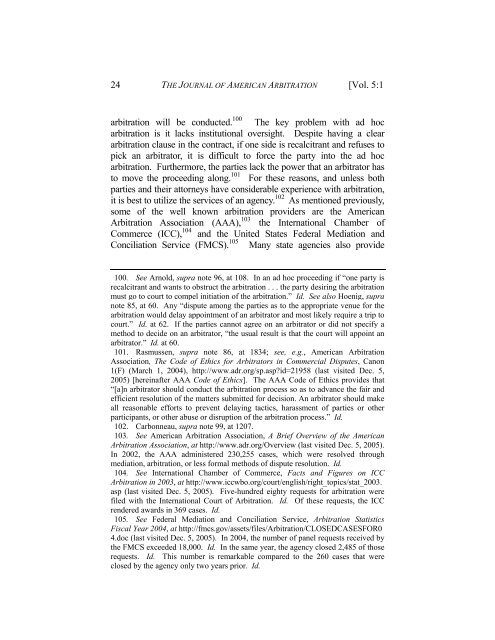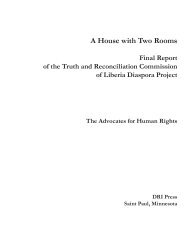2006/Vol. 5 No.1 - Hamline Law - Hamline University
2006/Vol. 5 No.1 - Hamline Law - Hamline University
2006/Vol. 5 No.1 - Hamline Law - Hamline University
You also want an ePaper? Increase the reach of your titles
YUMPU automatically turns print PDFs into web optimized ePapers that Google loves.
24 THE JOURNAL OF AMERICAN ARBITRATION [<strong>Vol</strong>. 5:1<br />
arbitration will be conducted. 100 The key problem with ad hoc<br />
arbitration is it lacks institutional oversight. Despite having a clear<br />
arbitration clause in the contract, if one side is recalcitrant and refuses to<br />
pick an arbitrator, it is difficult to force the party into the ad hoc<br />
arbitration. Furthermore, the parties lack the power that an arbitrator has<br />
to move the proceeding along. 101 For these reasons, and unless both<br />
parties and their attorneys have considerable experience with arbitration,<br />
it is best to utilize the services of an agency. 102 As mentioned previously,<br />
some of the well known arbitration providers are the American<br />
Arbitration Association (AAA), 103 the International Chamber of<br />
Commerce (ICC), 104 and the United States Federal Mediation and<br />
Conciliation Service (FMCS). 105 Many state agencies also provide<br />
100. See Arnold, supra note 96, at 108. In an ad hoc proceeding if “one party is<br />
recalcitrant and wants to obstruct the arbitration . . . the party desiring the arbitration<br />
must go to court to compel initiation of the arbitration.” Id. See also Hoenig, supra<br />
note 85, at 60. Any “dispute among the parties as to the appropriate venue for the<br />
arbitration would delay appointment of an arbitrator and most likely require a trip to<br />
court.” Id. at 62. If the parties cannot agree on an arbitrator or did not specify a<br />
method to decide on an arbitrator, “the usual result is that the court will appoint an<br />
arbitrator.” Id. at 60.<br />
101. Rasmussen, supra note 86, at 1834; see, e.g., American Arbitration<br />
Association, The Code of Ethics for Arbitrators in Commercial Disputes, Canon<br />
1(F) (March 1, 2004), http://www.adr.org/sp.asp?id=21958 (last visited Dec. 5,<br />
2005) [hereinafter AAA Code of Ethics]. The AAA Code of Ethics provides that<br />
“[a]n arbitrator should conduct the arbitration process so as to advance the fair and<br />
efficient resolution of the matters submitted for decision. An arbitrator should make<br />
all reasonable efforts to prevent delaying tactics, harassment of parties or other<br />
participants, or other abuse or disruption of the arbitration process.” Id.<br />
102. Carbonneau, supra note 99, at 1207.<br />
103. See American Arbitration Association, A Brief Overview of the American<br />
Arbitration Association, at http://www.adr.org/Overview (last visited Dec. 5, 2005).<br />
In 2002, the AAA administered 230,255 cases, which were resolved through<br />
mediation, arbitration, or less formal methods of dispute resolution. Id.<br />
104. See International Chamber of Commerce, Facts and Figures on ICC<br />
Arbitration in 2003, at http://www.iccwbo.org/court/english/right_topics/stat_2003.<br />
asp (last visited Dec. 5, 2005). Five-hundred eighty requests for arbitration were<br />
filed with the International Court of Arbitration. Id. Of these requests, the ICC<br />
rendered awards in 369 cases. Id.<br />
105. See Federal Mediation and Conciliation Service, Arbitration Statistics<br />
Fiscal Year 2004, at http://fmcs.gov/assets/files/Arbitration/CLOSEDCASESFOR0<br />
4.doc (last visited Dec. 5, 2005). In 2004, the number of panel requests received by<br />
the FMCS exceeded 18,000. Id. In the same year, the agency closed 2,485 of those<br />
requests. Id. This number is remarkable compared to the 260 cases that were<br />
closed by the agency only two years prior. Id.
















